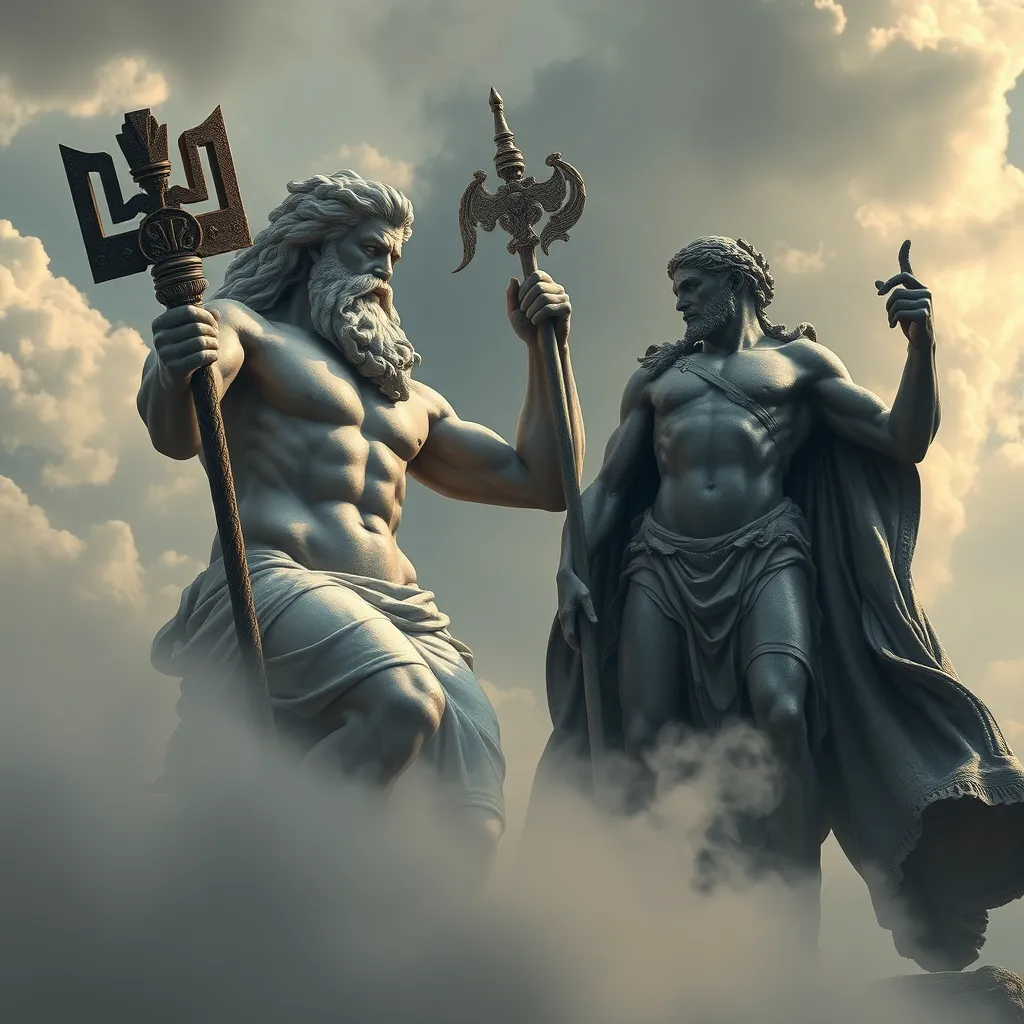Zeus and Prometheus: The Consequences of Defiance
I. Introduction
In the rich tapestry of Greek mythology, the figures of Zeus and Prometheus stand out as essential embodiments of divine authority and human defiance. Zeus, the king of the gods, represents the ultimate power and order, while Prometheus, a Titan known for his intelligence, symbolizes the spirit of rebellion and the quest for knowledge. The interplay between these two characters highlights the importance of defiance in mythological narratives, illustrating how a single act of rebellion can have profound consequences for both gods and mortals alike. This article explores how the story of Zeus and Prometheus encapsulates themes of rebellion, punishment, and the complex relationship between divine beings and humanity.
II. The Characters: Zeus and Prometheus
A. Background of Zeus: King of the Gods
Zeus, the ruler of Mount Olympus, is one of the most powerful and influential figures in Greek mythology. As the god of the sky and thunder, his attributes and powers include:
- Control over lightning and storms
- The ability to enforce laws and maintain order
- Role as a protector of hospitality and oaths
Zeus plays a critical role in many myths, often intervening in the affairs of gods and mortals to uphold justice and balance within the universe. His decisions and actions shape the course of human history, making him a central figure in mythological lore.
B. Background of Prometheus: Titan and Champion of Humanity
Prometheus, a Titan known for his cunning and creativity, is often portrayed as a champion of humanity. His characteristics and motivations include:
- A deep compassion for humankind
- The desire to empower mortals with knowledge and skills
- A rebellious spirit that defies divine authority
In mythological narratives, Prometheus is significant not only for his gifts to humanity but also for the consequences of his defiance against Zeus, which ultimately leads to his tragic fate.
III. The Act of Defiance: Theft of Fire
A. Context of Prometheus’s actions
Before Prometheus’s act of defiance, humanity was in a state of darkness and ignorance. They struggled to survive without the essential tools that fire provides. In this bleak context, Prometheus made the fateful decision to steal fire from the gods and bestow it upon mankind.
B. The symbolism of fire in mythology
The act of giving fire to humanity carries profound symbolism:
- Fire as a tool of civilization: It enabled humans to cook food, create tools, and build communities.
- Fire as a source of knowledge and enlightenment: It represents the spark of intellect and the drive for progress.
Through this act, Prometheus ignited not only a literal flame but also the metaphorical flame of human potential and advancement.
IV. The Punishment of Prometheus
A. Zeus’s response to the theft of fire
Zeus, infuriated by Prometheus’s audacity, decided to punish him severely. The nature of Prometheus’s punishment was both physical and psychological:
- He was bound to a rock where an eagle would eat his liver every day, only for it to regenerate each night.
- This eternal suffering symbolizes the consequences of defiance against divine authority.
B. The implications of divine retribution
The punishment of Prometheus reflects the power dynamics between gods and Titans. Zeus’s retribution serves to:
- Reinforce his authority and the need for obedience among both gods and mortals.
- Illustrate how punishment is used to maintain order and balance in the cosmos.
Prometheus’s suffering becomes a cautionary tale about the risks associated with challenging the established order.
V. The Consequences for Humanity
A. The impact of Prometheus’s gift on mankind
Despite his punishment, Prometheus’s gift of fire had lasting impacts on humanity:
- It led to significant advancements in civilization, including the development of technology and culture.
- However, fire also represents a duality, serving as both a blessing and a curse—capable of creation and destruction.
B. The moral lessons drawn from Prometheus’s actions
Prometheus’s defiance and its consequences impart several moral lessons:
- The risks of challenging authority can lead to severe repercussions.
- Yet, the theme of sacrifice for the greater good highlights the noble pursuit of knowledge and progress.
These lessons resonate through generations, shaping philosophical and ethical discussions about the nature of rebellion and authority.
VI. The Legacy of Prometheus
A. Prometheus in literature and art
Prometheus has left an indelible mark on literature and art, inspiring countless works across various mediums:
- In classical literature, he appears in Aeschylus’s play “Prometheus Bound,” which explores themes of suffering and defiance.
- Modern interpretations often depict him as a symbol of rebellion against tyranny and oppression.
B. The enduring relevance of Prometheus’s defiance
Prometheus’s legacy endures as a powerful symbol of:
- Rebellion against oppressive authority and the fight for humanity’s rights.
- The notion that suffering can lead to progress and enlightenment for society.
His story continues to inspire movements advocating for social justice and individual freedoms.
VII. Zeus’s Role in Justice and Authority
A. Zeus as a figure of law and order
Zeus embodies the principles of justice and authority in Greek mythology. As the overseer of the gods and humanity, he ensures that balance is maintained, and that transgressions are met with appropriate consequences. His role serves as a reminder of the importance of law, order, and morality in both the divine and mortal realms.
VIII. Conclusion
The story of Zeus and Prometheus is a timeless narrative that explores profound themes of defiance, punishment, and the intricate relationship between gods and mortals. Prometheus’s act of rebellion, though it led to his eternal suffering, ultimately empowered humanity and sparked an age of enlightenment. This myth serves as a reminder that while defiance against authority may come with great risks, it can also pave the way for progress and the greater good. Through their stories, Zeus and Prometheus continue to resonate with contemporary audiences, inviting reflection on the balance between obedience and rebellion in the pursuit of a better world.




